The government continues to deny the existence of a humanitarian crisis, blaming power failures on Venezuela’s proximity to the sun and suggesting people buy gold nuggets and plant medicinal herbs in their gardens to ward off poverty and disease.
Inflation continues its dizzying ascent. It has reached an eye-watering 800,000 percent and is on target, according to the International Monetary Fund, to surge to 10 million percent next year – driving severe hunger, shortages of basic goods, and accelerating the exodus from the country.
At least 2.3 million people are estimated to have fled Venezuela since 2015. One in 12 Venezuelans is now thought to have left the country.
As those abroad build new lives where shelves are laden with food and medicine, many of those IRIN encountered during two weeks of reporting across Venezuela – from the once-thriving fishing and sugar-producing areas of Cumana and Cariaco in the east to once-opulent and wealthy Maracaibo in the west – face a daily battle for survival.
Residents tell of children starving to death, of forming human chains to block roads to hijack trucks just to get food. They tell of hiding provisions – toilet paper even – in cemeteries, and of concealing their supplies in buckets under layers of trash. They tell of being prisoners in their own homes, frightened to leave for fear of looters, who don’t come for their televisions and computers – no one wants those any more – but for basic foodstuffs and medicine.
While some Venezuelans abroad paper social media with pictures of themselves posing jubilantly in front of powdered milk and shampoo, those who remain grind guava leaves with baking soda to make deodorant, and boil ash from the fire to make soap. It leaves people “itching all day long like gorillas,” says Leidis Vallenilla, explaining how the term violin has become a euphemism for body odour. “We have a whole orchestra here,” she laughs.
There is pride here, too.
“The inventive part of us has really been activated,” says Vallenilla.
The road holds secrets
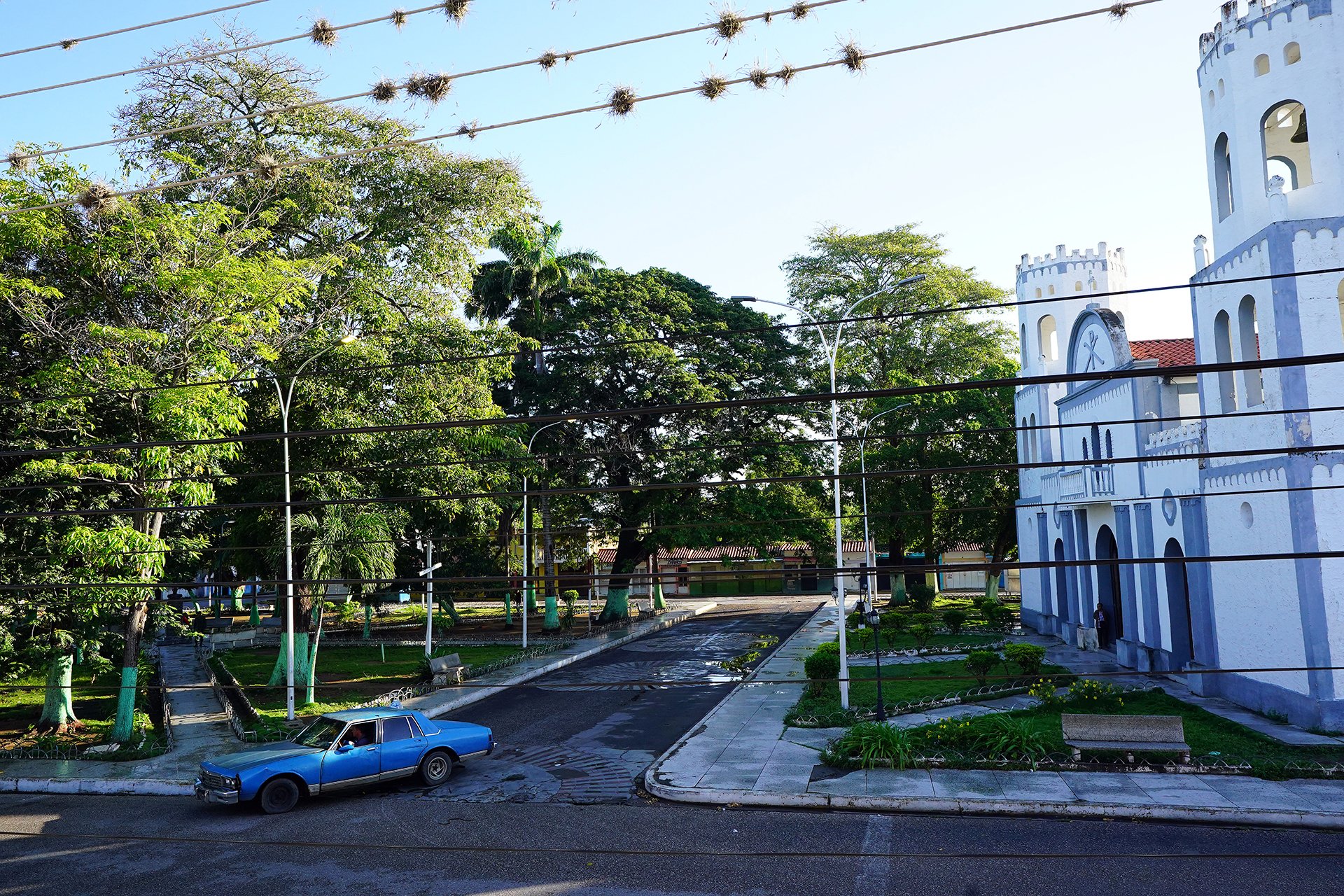
Lined with lush foliage and mango trees, dotted with the occasional home, the road from Cumana to Carupano in Venezuela’s eastern state of Sucre winds gently, every now and then rising to give a glimpse of the sea.
Pilongo – 23-year-old José Gregorio’s nickname, acquired from a cartoon he loved as a baby – leans into the windscreen and squints, staring closely into the verges. He’s looking for vehicles hiding in the bushes, where they wait to ambush cars.
As the crisis has deepened, so has the threat. This road is a main artery to the east; seemingly bucolic, it is one of the most dangerous in the country.
Hunger is behind most everything here.
Hunger was behind the widespread protests that roiled the country in 2015 and precipitated the flight of millions of Venezuelans from the country.
Then, shortages of essential foodstuffs – milk, butter, sugar, pasta, flour, oil, rice, beef, and chicken – were estimated at 80-90 percent.
It has only gotten worse since.
By 2018, according to a report produced by three Venezuelan universities, only one in 10 Venezuelans could afford enough daily food. Hunger has blanketed the country.
Cumana was once the fourth largest tuna processing town in the world. Nearby, around Caraico and Carupano, was a major sugar-producing area. Not any more. Now, people are starving.
Government food trucks travel the road carrying President Nicolás Maduro’s signature boxes of subsidised food.
Named CLAP – after the Spanish acronym for Local Committees for Supply and Production – Maduro rolled them out in 2016 in order, he declared, to circumvent the “economic war” being waged on Venezuela by the United States and his opponents.
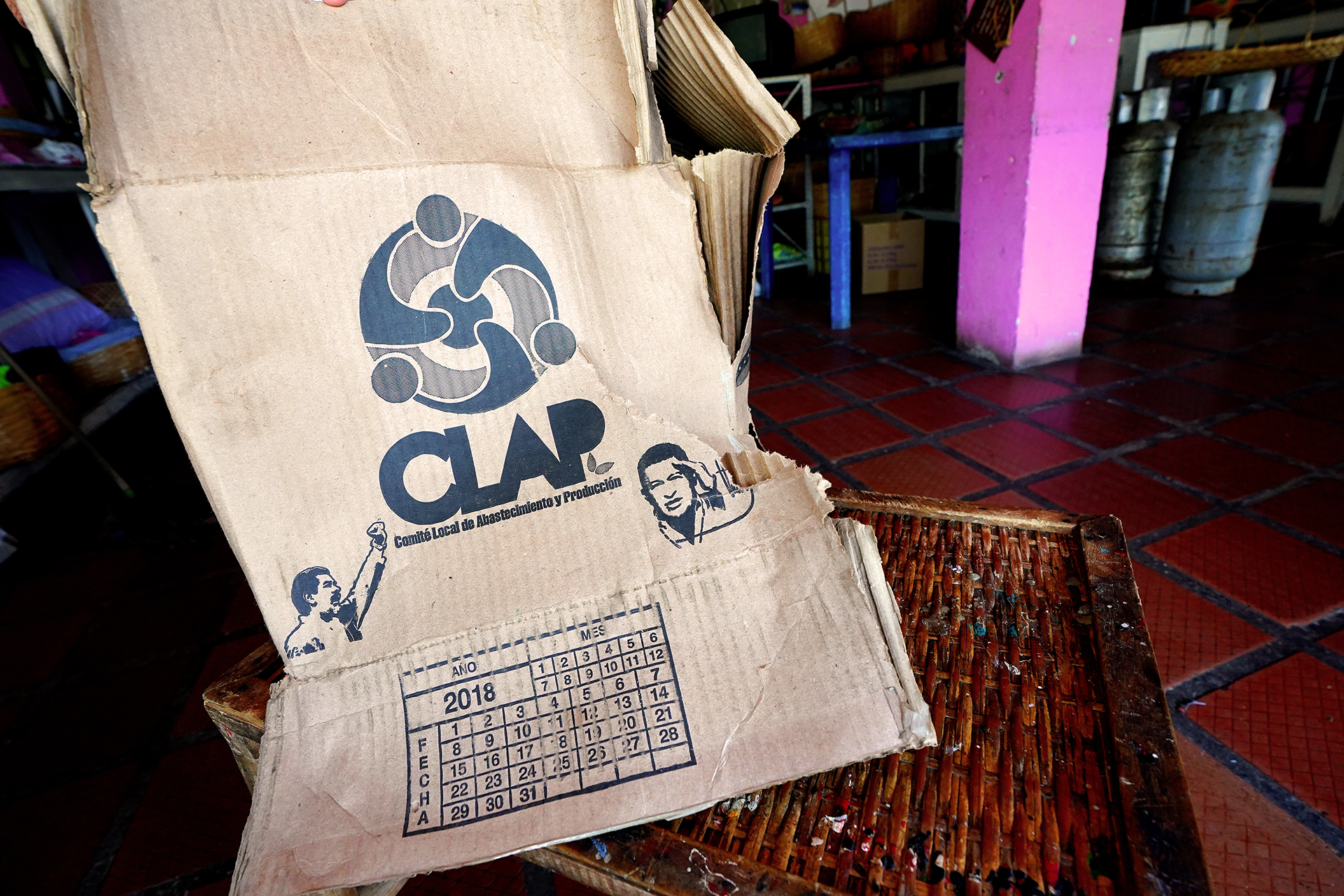
These boxes, the government claims, will feed a family of four for one week. They are supposed to be delivered once a month to all those who have signed up for the “Carnet de la Patria” – a controversial ID card that grants holders access to subsidised food.
However, according to those who get the CLAP boxes, the food arrives spoiled or past its sell-by date, is nowhere near enough to last even a week, and never comes more than, if you’re lucky, once every six weeks. Around Cumana, seven hours east of the capital Caracas, people say the boxes arrive once every three to four months.
Pilongo, Vallenilla, and other locals say the trucks still barrel through here daily – in convoys of as many as 40 – laden with precious food and never stopping for angered, hungry people. They recall how people started coating the road with oil so the trucks would skid into a ditch and then everyone would swarm around and loot them.
“A population which is not well fed become thieves and will steal any food no matter what.”
When the truck drivers wised up and took a diversion, people got metal strips with sharp teeth and laid them across the other road. Tires would blow out and trucks would still be looted. When the National Guard came and confiscated the metal strips, the community protested that they belonged to them. After a fight, the mayor agreed and returned the strips.
As hunger grew around the country so did the number of incidents like these, leading Maduro to issue an edict that armed National Guards must accompany the government food trucks. This has given greater license to the much-feared National Guard, who locals accuse of being behind the bodies they say have been turning up on nearby beaches.
The threat hasn’t stopped people. They just choose different trucks.
“Malnutrition is the mother of the whole problem,” says Pilingo’s former teacher, Fernando Battisti Garcia, 64, talking from his home in the town of Muelle de Cariaco. “A population which is not well fed become thieves and will steal any food no matter what.”
People call it “the Maduro diet”.
“As soon as people see a big truck coming with supplies,” explains Pilingo, “they go into the street – men, women, even children – and stop the truck and take the supplies.”
It happened just a few days ago, he says, adding that the National Guard has begun searching people’s houses and if they find anything – food, toilet paper, supplies – they take you to jail.
So people have started hiding the goods in tombs in cemeteries, or lowering them in buckets into water tanks.
“Everyone is just so desperate,” Pilingo shrugs.
With their erratic and infrequent delivery of meagre, often spoiled goods, CLAP boxes have done little to address hunger. What they have done, however, is line the pockets – and secure the loyalty – of military and government officials.
The US treasury estimates as much as 70 percent of the CLAP programme is victim to corruption, while accusations of military and government officials siphoning off millions of dollars and creating a lucrative food trafficking business and thriving black market have led to sanctions and intensifying international scrutiny.
The CLAP boxes have also succeeded in creating dependency. As inflation continues to spiral upwards and poverty escalates – jumping from 81.8 to 87 percent between 2016 and 2017 – more and more desperate people have become reliant on them to supplement their impoverished diets. In 2018, one in two Venezuelans say CLAP boxes are an “essential” part of their diet, while 83 percent of pro-Maduro voters say that CLAP is their main source of food.
Malaria and death
Vallenilla, 60, sits in a folding chair in her shop on the main road passing through Cerezal, a town of 1,000. Dozens of the colourful fabric dolls she makes and sells bob overhead hung from the ceiling, but she admits it has been a long time since she has had any customers.
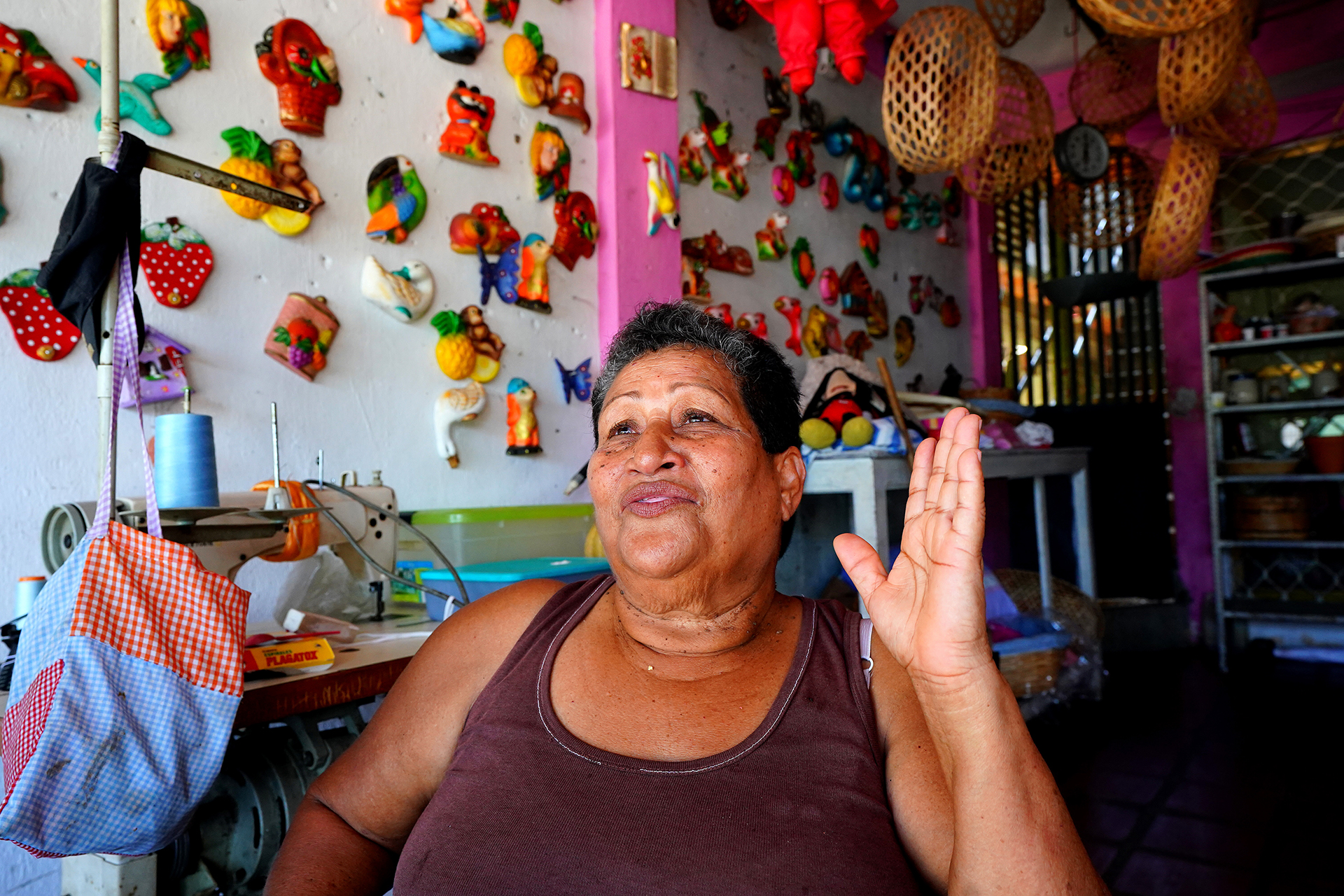
It has been a long time too since anyone around here has been able to get any medicine. And it has been even longer since people had enough food.
“We have lost a lot of kids here to malaria and hepatitis,” says Vallenilla. “You can see people whose eyes and lips have turned orange. But worst of all is malnutrition. Malnourished children are dying here – yes, in my community they are starving to death.
“The vice-president (Delcy Rodríguez) says there is enough food to feed three countries the size of Venezuela, but the truth is the malnourished kids, the elderly – that is what is real; that is what is the truth.”
Vallenilla nods across the street where a rail-thin woman is sitting in her doorway. “That woman used to weigh 230 pounds,” she confides. She gestures down the street. “And a woman lost her three-year-old to malnutrition last week, a few streets down….”
But those women won’t talk about it, says Vallenilla. No one here speaks out, she says. Everyone is scared; scared of losing their CLAP box; scared of the bodies turning up; scared of the repercussions of being identified through the Carnet de la Patria; scared of being reported to Maduro’s security forces; scared full stop.
“The vice-president (Delcy Rodríguez) says there is enough food to feed three countries the size of Venezuela, but the truth is the malnourished kids, the elderly – that is what is real; that is what is the truth.”
But Vallenilla isn’t scared. She is angry.
“About two months ago, malaria was in fashion here – everyone here was trembling from fever,” she seethes, fury rising in her voice. “We had to block the road for two days. We made a trembling chain of people just to force the government to bring us treatment.”
But even then, the government didn’t bring the full treatment. They brought only half a dose. Half treatments mean malaria will recur. Half treatments risk mosquitos building immunity. Half treatment is the best anyone can hope for these days across Venezuela. And, if they even get that, they can consider themselves lucky.
“This is why people die,” Vallenilla bellows. “How can you play with people’s health like that? Kids’ health? It is inhuman!
‘‘The most sacred thing is your child. Having to put your child in the ground, having your child die? It is the worst thing. How must a mother feel?”
Her brown eyes glare under the placid smiles of her handmade dolls overhead.
“I cannot change my feelings – I will not change my feelings for a bone!’ she says. “No matter how many bones they throw to me, I will not be silenced!’
Vallenilla’s thin neighbour across the street shrinks into the shadows at the sound of the raised voice.
“This is like a curse, a spell cast on the population,” Vallenilla sighs.
Electrocution and amputation
On a sunny Saturday afternoon, there is not a soul to be seen in Cariaco, a town of supposedly 22,000 souls in the east of Venezuela. It is eerily empty. Shops are shuttered and there is no one visible behind the fences barricading the single-storey pastel houses topped with several rows of electrified wires.
‘‘You used to be able to walk anywhere, anytime,’’ Pilingo reminisces.
No more. People are home. They all say they just don’t dare leave their homes for fear they will get broken into when they go out. Vallenilla says she even slaughtered her 17 ducks as she knew they would be taken otherwise.
The night before, someone had broken into a local house just to steal some clothes.
“Hunger is taking over in most towns,” Garcia, the former teacher, observes. ‘‘If people have the possibility of one or two meals in a day, they consider it like providence.”
“People go too long without food,” Leidis concurs. “You can’t blame them looting and hijacking.”
The consequences are showing up in unexpected ways.
Music blares from speakers mounted on a flatbed truck as it drives slowly through the small village of Pantonó, leading a young crowd surrounding a wooden coffin hoisted high by the cluster of men carrying it.
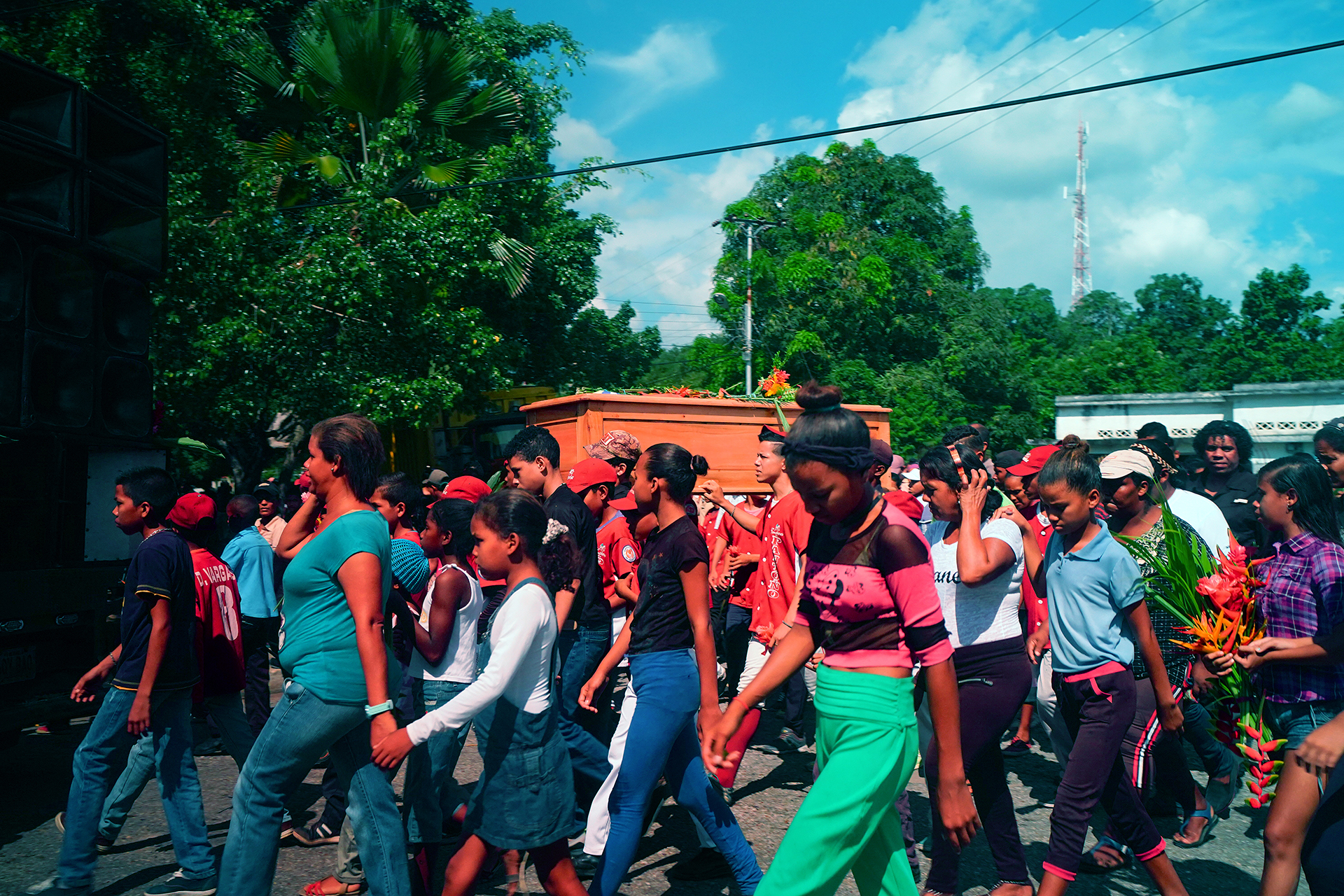
This is the funeral of a 13-year-old boy, a member of the local baseball team who was electrocuted when he tried to go through an electrified fence in the rain – it is thought, to find food.
There were virtually no cases of electrocution before the crisis, says Dr. Dora Colomenares, a surgeon at University Hospital in Maracaibo. Now it is a common occurrence as people breach electric fences hunting for food, medicine, and electricity sources to wire off to their homes.
An unprecedented number of children are also arriving at hospital with broken bones. Doctors told IRIN many injuries were hungry children left alone by parents to go out searching day in and day out for food and medicine, even children who had fallen out of fruit trees they had scaled ever higher searching for something to eat.
This desperation is also reflected in the thriving business of herb selling, as people across the country turn to traditional remedies in the absence of standard medicine.
Louisa Lopez, 54, the lone vendor in her row, is packing up the medicinal herbs and leaves she sells. Slits of light coming through the corrugated roof dapple the darkness, bouncing off empty stalls in nearby Cariaco market hall.
Lopez didn’t have this business before the crisis, but when medicine became scarce she anticipated that people would turn to traditional and homemade remedies. After doing her research on the internet, she set up a stall.
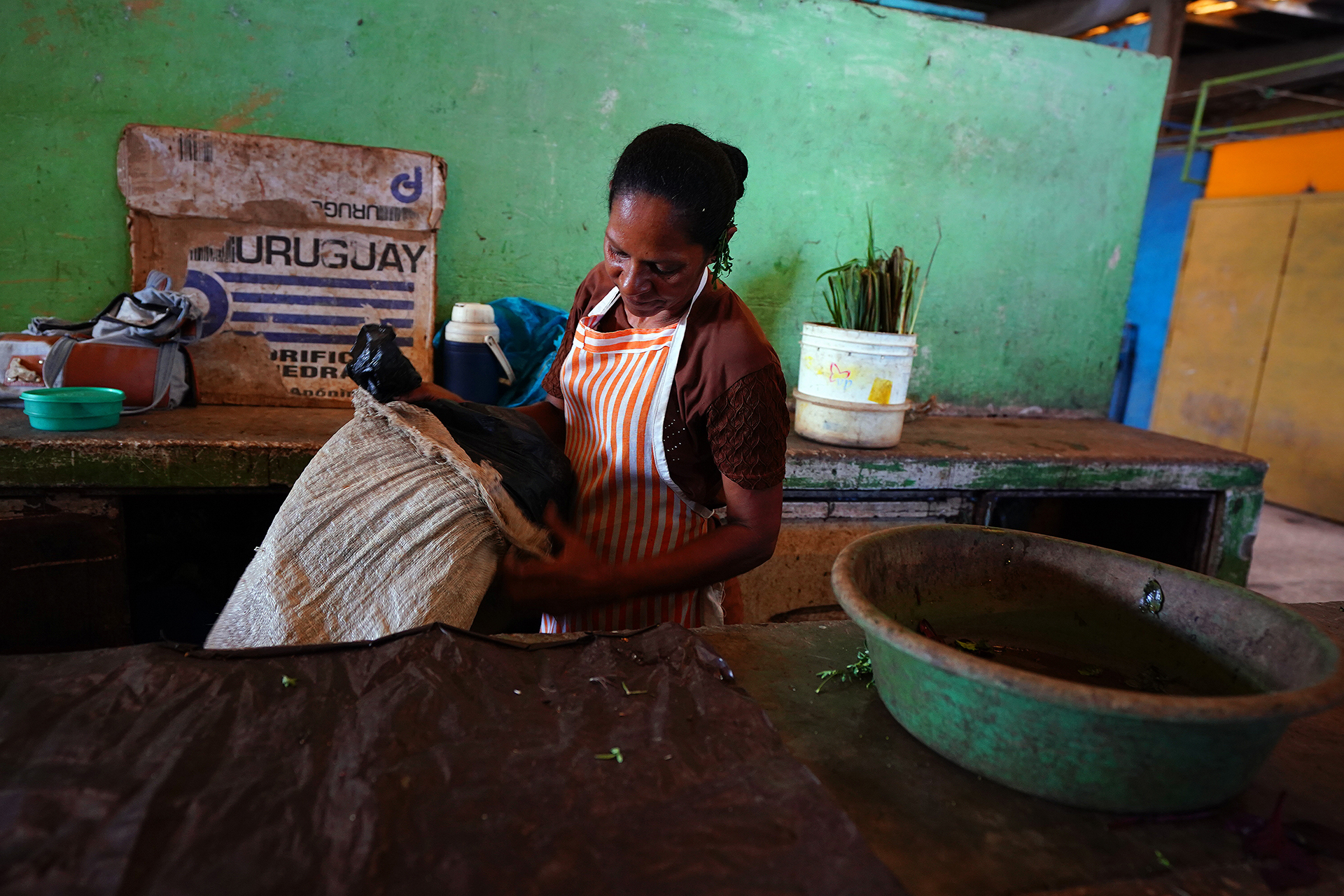
Her instinct has proven spot on. “Business,” she smiles, “is booming.”
But so is death.
Needless, pointless, avoidable. Deaths that would have been unimaginable even five years ago.
One man in Cumana is eager to talk but fearful of losing his job and CLAP box for speaking out. He asks that his real name not be used and steps inside his pastel-coloured home, where a framed photo of a middle-aged man is sat shrine-like under a vase of lilies atop a decorative lace tablecloth on a round table.
This, he explains, was his uncle “Alberto M” – a chef. He had died two weeks earlier of hypertension and diabetes, a failure of herbal medicine. The man picks up the photo and studies it in silence. His uncle’s warm smile and kind eyes beam back, blissfully unaware of the fate that would needlessly, avoidably befall him.
“There is a death daily around here,” says the man, placing the photo back on the table before reeling off a list of recent deaths in the neighbourhood: children from malnutrition; a mother and her unborn baby – more failures of herbal medicine – dead from a urine infection; a brother-in-law, shot, his family charges, by the police and whose body washed up on a nearby shore.
“But,” he says after a long pause, “we don’t even have coffins. The morgue is stacked high with dead bodies as people can’t find coffins.”
He explains how people have taken to bringing the body home and praying it doesn’t explode – as happened the week before just down the street – before they find a way to bury it.
Depression and anger
This endless struggle just to survive exacts a huge emotional toll.
“You see people who walk around feeling betrayed, with low spirits, sad – many who don’t want to live, because of the issue of food,” says Garcia, shaking this head, his eyes sad.
“The biggest psychiatric problem in the world is in Venezuela,” says Colomenares, the surgeon in Maracaibo. “Why? Because there are many depressed people, people who have lost hope. Melancholy and all these things mix with the problems the people are already going through, and they don’t know how to cope with it.”
Yet, as more and more people are driven to the brink, psychiatric wards are closing. The number of people attended to in public psychiatric facilities has dropped from 23,000 to 3,500 and those that are still working have neither food nor medicines, according to a report published by the Cuatro Por Venezuela Foundation in September.
Suicide has surged throughout the country.
Official statistics are hard to come by, but a psychiatric nurse at a large eastern hospital whispers in confidence, scared of losing his job for speaking out, that in his ward alone there were 10 suicides between January and July this year. By comparison, in 2017, there were only three or four. Before then, there were virtually none, he says.
Venezuelan children’s rights group CECODAP released a study that reported an 18 percent rise from 2017 in adolescents committing suicide in 2018, while Bloomberg found there were 131 suicides in Caracas alone in June and July, a large increase on the normal monthly rate.
Anger is growing at the seeming indifference of Maduro and his government – a government that refuses to acknowledge the scale of death and sickness of its own citizens.
"How can you not curse the government straight out? This damn government! This damn government!”
"I insist here there is no humanitarian crisis; there is a war on the country,” Diosdado Cabello, president of the National Constituent Assembly, said last month, before claiming: “Those who speak of humanitarian crisis are the ones who have created war against our country.”
Over a lunch of thin soup at his mission in the west of Venezuela, Friar Nelson Sandoval describes the scene in the summer when his whole village was overcome by malaria and there was no medicine. “It was like an apocalyptic film where people were so desperate; they were literally in the street having convulsions.”
He pounds his fist on the table. “How can you not curse the government straight out? How terrible it is when the electricity is out; when you’re hungry and yet food gets spoiled; when you’re tired as you couldn’t sleep as it was too hot? How do you give Mass? How can you not curse the government straight out? This damn government! This damn government!”
Emails to the government media department and the Minister of Information for comment on the widespread hunger, the hijacking of food trucks, and the lack of medicines were unanswered at time of publication.
ss/ag/js





